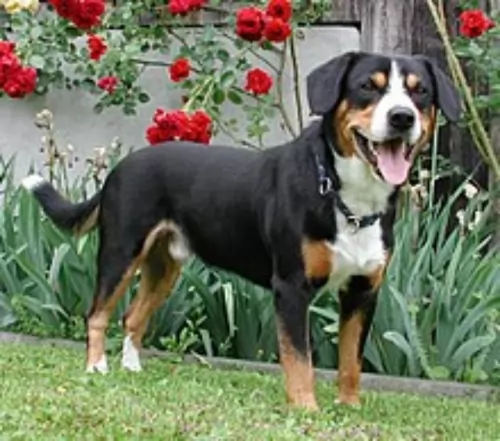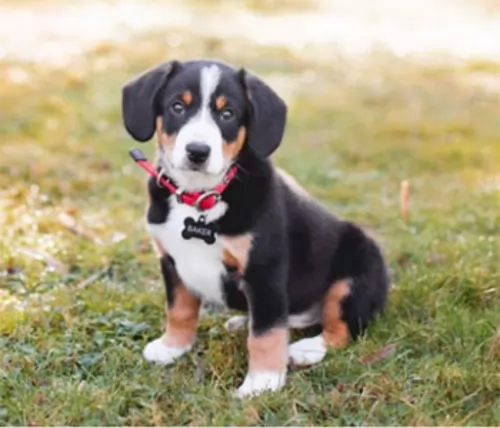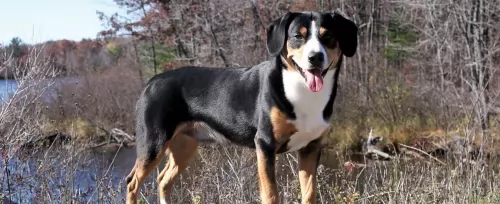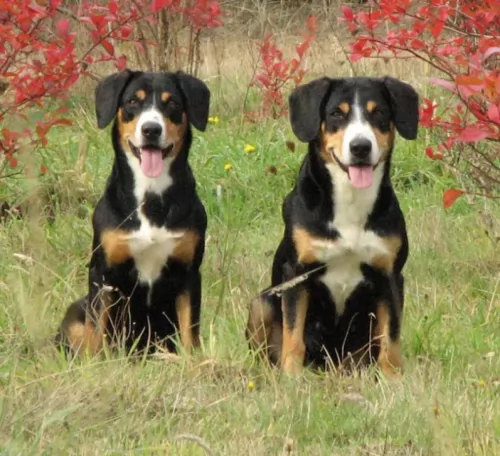 Petzlover
Petzlover Entlebucher Mountain Dog is originated from Switzerland but Shikoku is originated from Japan. Entlebucher Mountain Dog may grow 23 cm / 10 inches higher than Shikoku. Entlebucher Mountain Dog may weigh 23 kg / 50 pounds lesser than Shikoku. Both Entlebucher Mountain Dog and Shikoku has almost same life span. Entlebucher Mountain Dog may have more litter size than Shikoku. Both Entlebucher Mountain Dog and Shikoku requires Moderate Maintenance.
Entlebucher Mountain Dog is originated from Switzerland but Shikoku is originated from Japan. Entlebucher Mountain Dog may grow 23 cm / 10 inches higher than Shikoku. Entlebucher Mountain Dog may weigh 23 kg / 50 pounds lesser than Shikoku. Both Entlebucher Mountain Dog and Shikoku has almost same life span. Entlebucher Mountain Dog may have more litter size than Shikoku. Both Entlebucher Mountain Dog and Shikoku requires Moderate Maintenance.
 The Entlebucher Mountain Dog is the smallest of the Swiss Mountain Dogs, but he is still a powerful dog used to herd cattle. The four breeds are the Bernese Mountain Dog, the Greater Swiss Mountain Dog, the Appenzeller Mountain Dog and the Entlebucher. It was though that these dogs came to Switzerland with the Romans over 2 centuries ago. The Entlebucher was put to work guarding and herding sheep, pulling carts and flocking cattle. Toward the end of the 19th century the breed was on the edge of extinction because many were breeding them with German Shepherds. So, Franz Schertenleib, in 1889 brought all the existing Entlebuchers together and bred them. He is credited with keeping the breed alive.
The Entlebucher Mountain Dog is the smallest of the Swiss Mountain Dogs, but he is still a powerful dog used to herd cattle. The four breeds are the Bernese Mountain Dog, the Greater Swiss Mountain Dog, the Appenzeller Mountain Dog and the Entlebucher. It was though that these dogs came to Switzerland with the Romans over 2 centuries ago. The Entlebucher was put to work guarding and herding sheep, pulling carts and flocking cattle. Toward the end of the 19th century the breed was on the edge of extinction because many were breeding them with German Shepherds. So, Franz Schertenleib, in 1889 brought all the existing Entlebuchers together and bred them. He is credited with keeping the breed alive.
It is believed that the breed comes originally from a valley in the District of Cantons Lucerne and Berne, called Entlebuch. They were considered the same breed as the Appenzell Cattle Dog until 1913 when they were classified as a Mountain Dog – the fourth breed of Mountain Dog. The AKC did not recognize the breed until 2011.
 The Shikoku is from the Shikoku Island in Japan and they are very much like the Japanese Shiba Inu. There are six native Japanese dog breeds and the Shikoku is medium sized and sits in between the smaller Shiba Inu and the very large Akita Inu. All of the Japanese native breeds are members of the Spitz family. The Japanese have sorted their six breeds into 3 categories by size. Being medium size, the Shikoku is a member of the Shika-inus group. Others in this group are the Ainu Ken, the Kai Ken and the Kishu Inu. There are small differences between the three dogs in the Shika-inus group.
The Shikoku is from the Shikoku Island in Japan and they are very much like the Japanese Shiba Inu. There are six native Japanese dog breeds and the Shikoku is medium sized and sits in between the smaller Shiba Inu and the very large Akita Inu. All of the Japanese native breeds are members of the Spitz family. The Japanese have sorted their six breeds into 3 categories by size. Being medium size, the Shikoku is a member of the Shika-inus group. Others in this group are the Ainu Ken, the Kai Ken and the Kishu Inu. There are small differences between the three dogs in the Shika-inus group.
The Shikoku was bred to be a hunting dog in Kochi Prefecture to hunt boar and deer. Other names for the breed include Kochi-ken and Kishu dog or boar hound. This dog is considered to be the purest of the Japanese native dogs or Nihoken. They are today very , very rare. There are very few outsides of Japan, but some in North America are attempting to save the breed.
The are od Kochi Prefecture is a mountainous region with rough terrain that anyone outside of the area would have a hard time accessing. That is why the Shikoku is considered to be so pure as they were pretty well isolated in the mountains. The breeders were also isolated by the mountains and there was very little interbreeding. Although breeding the same dog, these different groups developed different lines of the Shikoku.
Documentation tells us that the number of originals lines was just two and these were the Western and Eastern Shikoku. The Western dog was known as the Mount Ishizuchi Shikoku and the Eastern as the Mount Tsurugi Shikoku. Within these two lines of Shikoku there are additional strains.
Within the Eastern line there is the Tokushima (lya) and the Koci-Aki strains. Within the Western line there is the Hata Uwahara, the Ehime-ken Shuso-gun and the Honkawa. Among these lines and strains, there are different coats and different colors; some heavier and some taller, but all figure into the development of the breed.
Finally, in the Showa Era the Japanese established the Dog Protective League and they began collecting the native dogs from around the country. They protected them so that the breed will go on. The Shikoku is today recognized as Foundation Stock by the AKC and it is fully recognized by the Japan Kennel Club, the Canadian Hound Club and the Shikoku has been declared a living Japanese “natural monument”.
Two bloodlines became the way the Shikoku were know after the war – the Honkawa and the Hata lines The Honkawa line were the descendants of the Choshun-go and the Hata line were the descendants of the Matsukaze-go. They bred the lines separately until 1955, when they mixed them to make the breed stronger. They are no longer considered separate in any way.
Because they are such primitive dogs, the Shikoku are good watch dogs and quite reserved with strangers. They need a lot of socialization to be a family pet but once they are, they make great companions. Intelligent, quick to learn and eager to please. Of the two lines of Shikoku dogs from the Western strains, the current Shikoku owes much of its current development to the Honkawa and Hata strains.
 The Entlebucher Mountain Dog is a muscular, compact, and medium sized dog. Their heads are square, and the skull is flat. He has dark eyes that are alert and expressive in a friendly way. Their ears are triangular and hang on the side of his head. With compact feet, a muscular body and well angled hocks, he is a good looking dog and ready for his jobs.
The Entlebucher Mountain Dog is a muscular, compact, and medium sized dog. Their heads are square, and the skull is flat. He has dark eyes that are alert and expressive in a friendly way. Their ears are triangular and hang on the side of his head. With compact feet, a muscular body and well angled hocks, he is a good looking dog and ready for his jobs.
His coat is striking, and it is familiar in its closeness to the other Mountain Dogs coats. Yet he has some distinctive differences that tell you this is not a Bernese or a Swiss, it is an Entlebucher.
 Today’s Shikoku is a medium sized breed with a Spitz like body – square with a head that is wedge shaped. The ears are pointed, and the tail is curved and feathered. They have arched toes and hard pads with dark, hard nails.
Today’s Shikoku is a medium sized breed with a Spitz like body – square with a head that is wedge shaped. The ears are pointed, and the tail is curved and feathered. They have arched toes and hard pads with dark, hard nails.
The two lines of the Shikoku are slightly different in built and look. The Honkawa strain is slender and athletic; agile and single coated. They have dark eyes and most of them are black and tan.
On the other hand, the Hata strain is much heavier boned, with the front more muscular than the rear. They have small ears, a wide skull and a strong undercoat. His eyes are shaped differently than the Honkawa. Their coats are also mostly red and tan.
 The Entle is a happy, clever dog that needs a job. They are intelligent and physical. They love people and throw themselves at you when they see you. They are loving and loyal but again he has to have a job.
The Entle is a happy, clever dog that needs a job. They are intelligent and physical. They love people and throw themselves at you when they see you. They are loving and loyal but again he has to have a job.
He makes a great watchdog, therapy dog or companion for your children. He only barks when he has to but is wary of strangers and he is territorial.
 Being isolated as they were, the Shikoku was a fairly healthy breed, no genetic testing has been done. Despite this they suffer a few of the same potential issues as other breeds their size.
Being isolated as they were, the Shikoku was a fairly healthy breed, no genetic testing has been done. Despite this they suffer a few of the same potential issues as other breeds their size.
Otherwise this is an agile and hardy breed with no known congenital health issues.
 The Entlebucher Mountain Dog is a large working dog. He needs good solid food, but he doesn’t need to be overfed. Give him about 2-3 cups per day fed in 2-3 meals. Be careful of Bloat in the large dog.
The Entlebucher Mountain Dog is a large working dog. He needs good solid food, but he doesn’t need to be overfed. Give him about 2-3 cups per day fed in 2-3 meals. Be careful of Bloat in the large dog.
The Entlebucher Mountain Dog is prone to these issues as well as those mentioned earlier.
Entlebucher Mountain Dogs love to play, to work and to exercise. They are great with people who want to walk them every day, run with them, ride bikes or hike. They can play for hours or work for hours. They need a lot of activity every day and excel at tracking, obedience, herding and agility.
 Feeding the puppy Be careful with feeding the puppy and adult as the breed is known to have a tendency toward obesity. Fresh food is better as it is what the breed has been used to, but a high quality puppy kibble is acceptable. Feed three times per day.
Feeding the puppy Be careful with feeding the puppy and adult as the breed is known to have a tendency toward obesity. Fresh food is better as it is what the breed has been used to, but a high quality puppy kibble is acceptable. Feed three times per day.
2.Feeding the adult He is a high energy dog so feed a high energy food designed for a medium sized dog. Feed in two meals each day.
4. Games and Exercises You will need a fenced yard for this breed and time to play with them. If not, you would need time to walk her more than once a day. They love to play indoors as well, chasing balls, learning new things. The breed make great companions for hiking, swimming, play frisbee or catch outside. They do well at agility, rally, obedience and flyball.